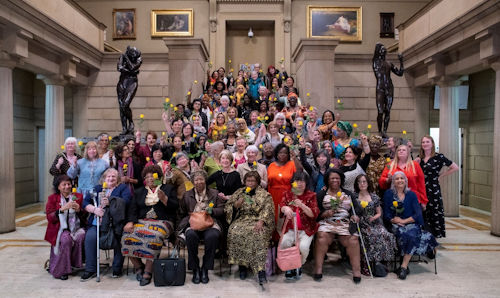Participatory research case study - Uncertain Futures project
In September 2023, the research impact team began a programme of work to build a picture of the participatory research landscape at the University, to help us to better support those undertaking it. As part of this, we funded activities that captured learning from existing participatory research projects, so that it could be shared, aiding the development of good practice across the University and beyond.
Those projects included Uncertain Futures – an art and research collaboration that aims to highlight and analyse the intersectional inequalities facing women over 50 around work. Dr Elaine Dewhurst, a Senior Lecturer in Employment Law at the University of Manchester is a co-lead researcher on the project, alongside Dr Sarah Campbell, a Senior Lecturer in the Department of Social Care and Social Work at Manchester Metropolitan University (Manchester Met).
Conceived by the artist Suzanne Lacy, the project was delivered in partnership with Manchester Art Gallery and Manchester Met and was built around three exhibitions. The first exhibition centred on live interviews with 100 women over 50 years of age from across Greater Manchester. It attracted an incredibly diverse range of participants, because of the trust built through an advisory group drawn from communities from across the Combined Authority and is exemplary in the way the academic and community co-researchers worked together throughout.

The participatory nature of the project means the team has struggled to obtain research funding since its inception in 2018. The women over 50 who were at the heart of the research were involved from the development of the questions through to ongoing activities to drive forward policy change, but this made it difficult to articulate proposed outcomes in the ways funders required. As a result, the team relied on funding from a diverse range of organisations, such as Arts Council England and the National Lottery Heritage Fund, and both partner universities provided support with policy engagement and impact development.
Impact for the project - and Elaine
Alert to the value of the project’s methodologies and potential to generate meaningful societal impact, The University of Manchester had already provided seed corn funding to develop the early-stage research. The research impact team in the Faculty of Humanities also provided Elaine with ongoing support for impact planning. The University then pooled its UKRI Participatory Research allocation with Manchester Met’s to support the project further, funding the co-creation of a manifesto for change with the advisory group women, based on themes identified through the interviews with the 100 women. Printed on floor to ceiling banners, that manifesto formed the centrepiece of the final iteration of the exhibition.
For Elaine, “the support received through funding and the expertise and encouragement from the research impact team have been pivotal in ensuring the project has achieved its research impact potential. Without this support, it is unlikely that the project could have developed the manifesto which has been essential to influencing policy and raising awareness of the project.”
The project team are also using the funding to develop a visual contribution map and multimedia toolkit to capture and share learning about their inclusive approach to research and impact.
Elaine explained: “The idea for the toolkit developed out of discussions with the impact team and has been an incredible mechanism through which to reflect on the legacy of participatory research and its ability to amplify voices, build capacity, create dialogue, influence practice and policy and exchange knowledge.”
On a personal level, Elaine says the support from the University’s impact teams has been instrumental in her career development: “I have been given a unique opportunity to not only facilitate the development of a new research method in my field but also to engage wholeheartedly with this process. It has allowed the project to develop seamlessly, which has been crucial to maintaining relationships and the expectations of our community partners.
“This has been a career defining project for me and the support received in various forms has provided me with a unique platform from which I can independently develop new and exciting research opportunities within the participatory research field.”
Impact on the wider team, UoM - and society
Moreover, Elaine and the impact and social responsibility teams recently supported Uncertain Futures Advisory Group member, Atiha Choudhary’s successful application for a Simon Industrial and Professional Fellowship in the Faculty of Humanities. As part of this, Atiha will work with a variety of colleagues from across the University, including the impact and social responsibility teams, to exchange ideas. Building on experiences from the project and Atiha’s many decades of work as a community leader and connector, the fellowship will extend Uncertain Futures’ impact on practice at The University of Manchester
The Uncertain Futures film, which reflects on how relationships are developed and how challenges are overcome within a project of this nature, captures the nuanced impacts on all involved. Uncertain Futures’ achievements were also recognised in the 2022 Manchester Culture Awards, where it won the Promotion of Equality and Social Justice category. As Sarah Vickerstaff, Professor of Work and Employment at the University of Kent*, observed in the project report, it is “a different way of undertaking research, one that is all about collaboration between the art gallery, the artist, researchers and the community, widely understood. The result is a unique participatory art project including visual, audio and written material that is a genuine joint effort and all the richer for that. It serves as a lesson in how to give active voice to frequently marginalised groups in society.”
Visit our engaged research hub to access case studies and resources about engaged research practices, including co-production and participatory approaches.
*The project title came from a research consortium led by Professor Vickerstaff, which was titled ‘Uncertain Futures’.
